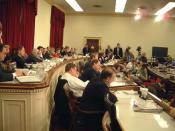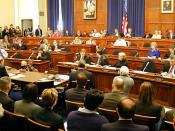James Q. Wilson, American Government 1998 Page 330.
Dodd, Lawrence "Congress and the Quest for Power" American Government Ed. Peter Woll.
New York: Longman Publishers, 2002 371
Fiorina, Morris "The Rise of the Washington Establishment" American Government Ed. Peter Woll.
The Framers' of the United States' Constitution created a divided government and delegated power to each of the three branches of government they created. They did not want to concentrate all the power into a single governmental institution; even one elected by popular vote, because they feared such a consolidation of power would lead to an oppressive or impassioned majority. Hence, legislative responsibilities were granted to Congress, which was further subdivided into a Senate and House of Representatives, as decided in the Great Compromise. This layout of a bicameral legislature was constructed in an attempt to thwart a future concentration of power that could lead to an oppressive majority. Since its creation, Congress has endured an ongoing conflict regarding the internal distribution of power.
There are two competing values which struggle for supremacy in both the House and Senate which consist of: efficiency by means of a strong and centralized leadership, and that of participation through a decentralization of leadership. Congress has evolved through six major phases alternating between the two forces over the past two centuries, however the general trend has nonetheless been towards decentralization. Due to the growing quantities of separated and specialized committees and subcommittees, the undermined power of leadership seats and growing authority of Committee Chairs, and the pluralist regulation of the human desire for attaining power achieved through reelection, Congress continues its progression towards decentralization.
Congressional Committees continue to define the legislative process and the diffusion of committee power adds new dimensions to divided government. "The most important organizational feature of Congress is the set...



Refreshingly good
I find so many essays on this website crap people submit just to get super status to read other people's crap. This essay was well written with clearly thought out ideas. I thank the author for restoring my faith in cheathouse submissions.
8 out of 8 people found this comment useful.